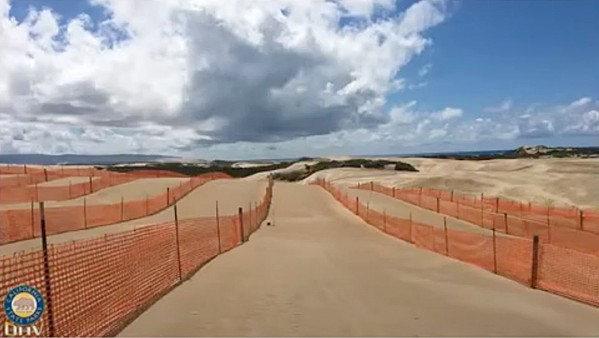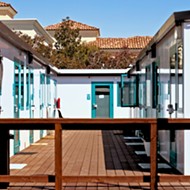Oceano Dunes officials battle lawsuits and public frustration as they race to control dust emissions and off-road driving
By Bulbul Rajagopal[{
"name": "Newsletter Promo",
"id": "NewsletterPromo",
"class": "inlineCenter",
"insertPoint": "4",
"component": "15264767",
"requiredCountToDisplay": "0"
},{
"name": "Ad - Medium Rectangle CC01 - 300x250",
"id": "AdMediumRectangleCC01300x250",
"class": "inlineCenter",
"insertPoint": "8",
"component": "2963441",
"requiredCountToDisplay": "12"
},{
"name": "Ad - Medium Rectangle LC01 - 300x250",
"id": "AdMediumRectangleCC01300x250",
"class": "inlineCenter",
"insertPoint": "18",
"component": "2963441",
"requiredCountToDisplay": "22"
},{
"name": "Ad - Medium Rectangle LC09 - 300x250",
"id": "AdMediumRectangleLC09300x250",
"class": "inlineCenter",
"insertPoint": "28",
"component": "3252660",
"requiredCountToDisplay": "32"
}]
Dust—annoying when it settles daily on countertops, but Herculean to manage when it blows around the Oceano Dunes.
Then, throw a lawsuit into the mix.
California State Parks and San Luis Obispo County Air Pollution Control District (APCD) faced this dilemma together when a SLO Superior Court judge recently invalidated one of their dust control regulation agreements.
The APCD-maintained regulation known as Rule 1001 applies to any entity operating a coastal dune area greater than 100 acres with vehicle activity. In this case, the controversial Oceano Dunes State Recreational Vehicle Area is operated by State Parks, and the rule requires State Parks to implement a plan that reduces particle matter emissions (dust), also called PM10, to a certain level.
The lawsuit, filed in 2014 by Friends of Oceano Dunes, argued that the agreement between the APCD and State Parks changed the rule's dust emission parameters without public notice. The court agreed and nullified that agreement on Oct. 7. But APCD officials said they haven't implemented Rule 1001 in more than three years.
"This is a 'scorched earth' tactic that is designed to use up limited public moneys that would be otherwise used to help clean the air," APCD Executive Director Gary Willey said.
Friends is a nonprofit organization that champions off-road driving, which is an activity that the local APCD believes increases dust emissions in the dunes that pose a health risk. Oceano Dunes officials, regulatory agencies, and Friends have been at loggerheads for several years over off-highway vehicle (OHV) use in the park. Lawsuits from all sides peppered the conflict, which came to a head in March 2021 when a unanimous California Coastal Commission vote mandated State Parks to end OHV use at Oceano Dunes by 2024.
"Friends does not believe OHV will be banned at the Oceano Dunes. Friends has been very successful in the court systems identifying and winning against the [Coastal Commission], APCD, State Parks, and county, to name a few," Friends President Jim Suty told New Times.
Suty also said the APCD was "lying" about not using Rule 1001, which Willey refuted. Willey said that the APCD booted the rule in favor of an abatement order that holds APCD and State Parks more accountable for dust emissions because a hearing board oversees it.
"Since September 2017 when we began the Stipulated Order of Abatement process, we have not enforced any Rule 1001 requirement. Hundreds of violations of Rule 1001 have occurred since that time; not a single notice of violation has been issued," Willey said.
But Willey added that the APCD is trying to meet everyone halfway. Suty thought it wasn't possible because of a compromise made in 1982 that shrunk the driving area on the dunes from 15,000 acreages to 1,500.
"Now fast forward, people want to take more and ask us why we are not willing to 'meet halfway,'" he said.
Willey sympathized with that view, adding that the acreage reduction didn't involve dust issues.
"There are other laws that have caused the riding to be much more concentrated, and I feel for their pain. [The riding] made the dust worse," he said. "Some in the riding group have argued that by reducing the acreage, they've concentrated the riding into smaller areas and caused more dust. They have many valid points, but I have a public health mandate [to take care of]."
Overall, the court ruling didn't bother Willey, as it doesn't impact current dust control projects, and State Parks agreed.
"The current court decision will not have an impact on ongoing dust control efforts at Oceano Dunes SVRA since most of the dust control projects that State Parks is implementing are more stringent than Rule 1001 and are implemented pursuant to the Stipulated Order of Abatement, and not under Rule 1001 or the consent decree," State Parks Public Information Officer Jorge Moreno said via email.
California's PM10 emissions standard is 50 micrograms per cubic meter of air over a 24-hour period. Rule 1001 has a more lenient threshold of 55 micrograms per cubic meter for the same time period. Even when APCD and State Parks observed the rule, they aimed to reduce dust emissions to the state standard. Willey said it was "only a goal," but the lawsuit called it a "rule change."
Though Suty said that the nonprofit doesn't advocate for one performance standard over the other, he maintained that dust emissions in the Oceano Dunes are not a "huge health hazard."
But many community members disagree and are even frustrated with APCD's progress on meeting its December 2023 goal of reducing dust emissions by 50 percent. As of July 2021, dust emissions were reduced by 22 percent. By July 2022, the APCD expects that number to hit 31.7 percent. This leaves roughly 18 months to bridge the 19 percent gap.
Some members of the public expressed their annoyance during the Oct. 14 APCD hearing board meeting, citing dust emissions as a public health issue for residents at the Nipomo Mesa summit.
"It appears we have triers, not doers. I would say if the State Park leaders who were in charge of the [dust] mitigation were generals in World War II, we'd all be speaking German now," resident Tom Ryan said at the meeting.
In a bid to reach their dust reduction goal, APCD officials said they opened up 90 acres of new land for treatment. APCD presented the hearing board with a plan to mitigate dust on 53 acres of existing treatment space by growing vegetation. But some considered this work plan's momentum to be too slow.
Kara Woodruff, one of the hearing board directors, acknowledged that though the APCD and its Scientific Advisory Group steadily increased more acreage for dust control treatment, the current pace makes reaching the December 2023 deadline "overly optimistic."
She requested holding off on approving the work plan until staff presented a more detailed report of progress. But she changed her mind about approval after Willey pointed out an extreme time crunch.
"We can't afford to wait long to go through the rest of the processes. If we delay approval of this plan, ... we'll get bogged down and we won't get stuff done in the springtime when it's still raining," he said at the meeting.
The board unanimously approved the current work plan and will review dust reduction progress in March 2022 and possibly modify the abatement order.
"People can feel somewhat comfortable in the idea that it won't be just another progression of workshop and reports," hearing board counsel Tim McNulty said. "But rather, it will be a chance to make substantive amendments." Δ
Reach Staff Writer Bulbul Rajagopal at [email protected].
Latest in News
Comments (4)
Showing 1-4 of 4
Readers also liked…
-

Coast Unified teachers upset over new position's salary and qualifications
Oct 20, 2022 -

SLO police identify alleged driver who hit and killed couple
Dec 22, 2022 -

When the levee breaks: Oceano residents, county officials walk a tightrope of regulations to manage Arroyo Grande Creek, which some say led to the levee's failure in January
May 18, 2023








